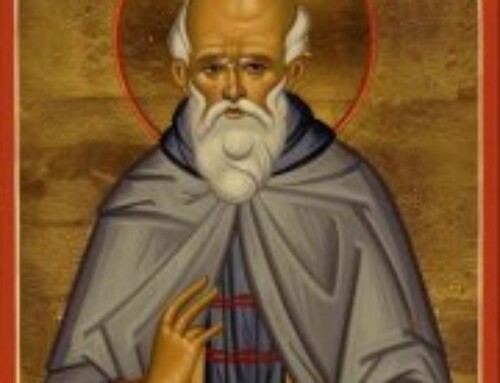From the Again Magazine Volume 18, Number 3 – September, 1995 Page 8
The Fathers Speak…
St. Irenaeus: On the Spiritual Gifts
Saint Irenaeus, Bishop of Lyons (c. 130—c. 200) was a disciple of Saint Polycarp. who in turn was a disciple of Saint John the Evangelist. He is thus one of the earliest witnesses to the Christian tradition following the death of the Apostles.
Were the gifts of the Spirit in operation in the early Church? Commenting on 1 Corinthians chapter 12 (“Now concerning spiritual gifts, brethren, I do not want you to be ignorant . . .“), this early saint clearly says “yes!” But he places the gifts squarely within the context of the Church and under the succession of the Apostles:
“Where, therefore, the gifts of the Lord have been placed, there it behooves us to learn the truth, [namely] from those who possess that succession of the Church which is from the apostles, and among whom exists that which is sound and blameless in conduct as well as that which is unadulterated and incorrupt in speech. For these also. . . expound the Scriptures to us without danger, neither blaspheming God, nor dishonoring the patriarchs, nor despising the prophets.”
Saint Irenaeus clearly states that the prophetic gifts are still in operation: “For the prophetical gifts remain with us, even to the present time. And hence you ought to understand that [the gifts] formerly among your nation [the Jews] have been transferred to us.” However, he goes on to warn that “just as there were false prophets contemporaneous with your holy prophets, so are there now many false teachers amongst us, of whom our Lord forewarned us to beware.”
As one example of a false prophet, to whom the Lord’s warning applies, Saint Irenaeus gives the case of Marcus the Magician. The heretic Marcus “is a perfect adept in magical impostures. . drawing away a great number of men, and not a few women, he has induced them to join themselves to him, as to one who is possessed of the greatest knowledge and perfection, and who has received the highest power from the invisible and ineffable regions above.”
Marcus not only prophesies himself, but has an apparent ability to impart this anointing to his disciples so that they too might prophesy. Saint Irenaeus recounts to his readers the following scenario:
“He devotes himself especially to women. . . whom he frequently seeks to draw after him, by addressing them in such seductive words as these: ‘I am eager to make thee a partaker of my Charis.
Behold Charis has descended upon thee; open thy mouth and prophesy.’ On the woman replying, ‘I have never at any time prophesied. nor do I know how to prophesy;’ then engaging, for the second time, in certain invocations, so as to astound his deluded victim, he says to her, ‘Open thy mouth, speak whatsoever occurs to thee, and thou shalt prophesy.’ She then, vainly puffed up and elated by these words, and greatly excited in soul by the expectation that it is herself who is to prophesy, her heart beating violently [from emotion], reaches the requisite pitch of audacity, and idly as well as impudently utters some nonsense as it happens to occur to her, such as might be expected from one heated by an empty spirit. . . .Henceforth she reckons herself a prophetess, and expresses her thanks to Marcus for having imparted to her of his own Charis.”
Though Marcus appears to have expertise in “leading” people into the experience of prophetic utterance, Saint Irenaeus firmly states that “the gift of prophecy is not conferred on men by Marcus, the magician.” Irenaeus does not discount the possibility that a real spiritual phenomenon is taking place. but he says, “It appears probable enough that this man possesses a demon as his familiar spirit, by means of whom he seems to prophesy, and also enables as many as he counts worthy to be partakers of his Charis themselves to prophesy.”
According to Saint Irenaeus, true manifestations of the prophetic spirit are not subject to the will of men: “Only those to whom God sends His grace from above possess the divinely-bestowed power of prophesying; and then they speak where and when God pleases.. . . But such spirits as are commanded by these [false prophets], and speak when they desire it, are earthly and weak, audacious and impudent, sent forth by Satan for the seduction and perdition of those who do not hold fast that well-compacted faith which they received at first through the Church.”
Lest we, in reaction, go to the opposite extreme, and deny the prophetic spirit, Saint Irenaeus says: “Wretched men indeed who . . . set aside the gift of prophecy from the Church. . . . We must conclude that these men cannot admit the Apostle Paul either. For in his Epistle to the Corinthians, he speaks expressly of prophetical gifts, and recognizes men and women prophesying in the Church.”
From Irenaeus, Against Heresies, (Eerdmans, The Ante-Nicene Fathers, Volume I).

